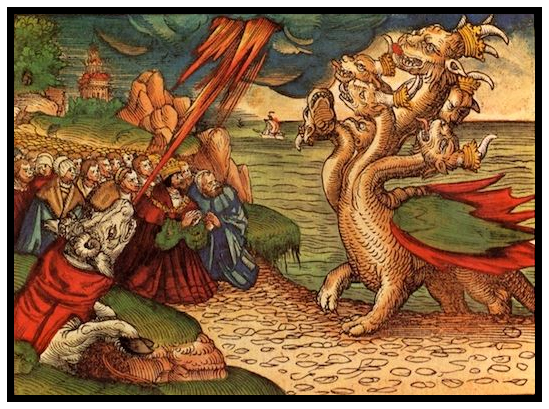Feeding the Beasts
Column# 306 July 16, 2021
Big Tech’s greed and manipulations for milking the system know no boundaries. Because Google, Facebook, Microsoft, Twitter, Apple, and similar international businesses are major players in every country in the world, all of humanity is experiencing the greatest concentration of power ever to be in the hands of so few people. Unfortunately, as these powerful monopolies grow bigger and more powerful they destroy free markets and freedom. In the process their lust for more money, power, and control can never be satisfied. Therefore, just like politicians, the greater their power, the more corrupt they become. Seeking to avoid the money-power trap is the reason why Steve Wozniak, cofounder of Apple Inc., gave away most of his vast fortune.1
The greed and cold-hearted manipulation that grip the world’s monied oligarchs have gone too far. It’s so extreme these days they’ve even earned numerous enemies on both sides of the political aisle in many countries, which in itself is an unusual feat. As a result, there’s plenty of commentary being bandied about these days complaining about evil oligarchs who are blinded by hubris and greed.2
On the other hand, who is going to step up to bat against them? Many of the oligarchs have an individual net worth in the neighborhood of $100 billion. That’s a lot of net worth. If you spend $1 million a day, it takes 274 years to spend $100 billion. That kind of money gives oligarchs the wherewithal to bribe nearly anyone. And if that doesn’t work, they’re capable of destroying people professionally if they don’t comply with their wishes.
I do not have a problem with people building valuable businesses. But if their businesses get too big, too often they still aren’t satisfied so they squash or buy up competitors seeking to be the biggest and greatest. Even if they do provide goods and services for less money, the societies they serve will still lose out because of limited opportunities, less innovation, less diversity, and a shrinking middle class. An extreme example would be McDonald’s Corp. buying every restaurant in the world. How horrible would that be?3
These days oligarchs are controlling the conversation in the public square, cancelling scientific facts that don’t square with their narrative, cancelling conservative viewpoints and even a former president of the United States, subverting democracy, and paying off politicians right, left, and center. At the same time they are cheating more frequently in their business practices. I even see cheating in my tiny industry as we try to compete with big outfits who sell phony grass-fed meats. I wrote a column a couple years ago about my experience with Sprouts Farmers Market. It’s titled Phony Grass-Fed.4 5
Another trick search engines play on internet businesses is to get people to click on more ads than what they would normally click on. The search engines are structured in such a way that businesses must advertise their own names and websites as keywords. That really got going when ads were moved from side panels and placed above the organic search listings with the ads looking like regular search results. Now, if a shopper searches for “texasgrassfedbeef” or “slanker meats,” other advertisers use those keywords to trigger their ads to appear on top of the organic searches. Then sometimes the search engines even place competitive organic search responses above the organic links to the business the shopper was seeking. That’s why you see businesses running ads for themselves even when they know they will show high up in the organic search results.
The busy shopper usually clicks on the first thing they see that resembles the link for the store they want to shop. But, unless they’re careful, they’ll click on an ad—not the organic link. The difference is anywhere from $0.05 to $1.50 per click going straight from the retailer to the search engine. A loyal shopper certainly doesn’t need to respond to an advertisement to find a store they shop at all the time. They just want a link and they want it quickly. But in their haste they make their retailer pay the search engine for the click and the search engine gets richer at the retailer’s expense.
Search engines discovered long ago how to manipulate their revenues higher by structuring ad placement versus organic search responses. They also figured out how to analyze shoppers and even have ads “follow” them while they surf the net. These tactics have forced multistate internet businesses to advertise just to protect their name. The result of the search engine strategy that we experience is that most of our ad responses are from longtime customers.
Most platforms, such as social media sites and search engines, are free for individuals and businesses alike. Their advertising seems innocent on the surface, but all of these tech companies know how everyone functions and what they want. Worldwide, on a daily basis, they may have a billion or several billion chances to snag a dollar here or twenty cents there. Obviously it adds up and it just keeps growing.
Here’s an example of that growth. Google’s annual revenue is about $200 billion ($548 million per day) with net earnings of $55 billion ($150 million per day). It has a stock market capitalization of $1.7 trillion. In other words the company is valued at nine times it sales and 34 times its earnings. Google’s largest shareholders are Larry Page, cofounder, who owns approximately 40.1 million shares worth about $100 billion and Sergey Brin, cofounder, who owns approximately 38.9 million shares worth about $97 billion. When people have incredible wealth, they tend to believe they are greater than God and the rest of us aren’t all that smart because we aren’t worth as much as they are. Therefore, what they say carries more weight and they know best how we should live.
To keep from paying these outfits more than their due, when I search a business or product, if I see their ad and can’t quickly find their organic link below the ads, I copy the website URL from the ad and paste the appropriate URL in my browser’s address bar—sidestepping the ad link. It’s a small protest, but it saves the store some money and I didn’t feel like I was feeding the beast. The beasts have enough already.
To your health.
Ted Slanker
Ted Slanker has been reporting on the fundamentals of nutritional research in publications, television and radio appearances, and at conferences since 1999. He condenses complex studies into the basics required for health and well-being. His eBook, The Real Diet of Man, is available online.
Don't miss these links for additional reading:
1. Why Apple Co-founder Steve Wozniak Doesn’t Trust Money by Emmie Martin from CNBC Make It
2. Republicans, Democrats ‘Unified’ Against Big Tech: Rep. Buck by Zachary Stieber
3. Apple Co-Founder Steve Wozniak: “It's Time to Recognize the Right to Repair” by Michelle Toh, CNN Busines
4. Internet Bias Distorts National Conversation by Frank Vernuccio
5. Phony Grass-Fed by Ted Slanker
From Merriam-Webster:
Definition of oligarchy: a government in which a small group (of oligarchs) exercises control especially for corrupt and selfish purposes.
Definition of aristocracy: government by the best individuals or by a small privileged class.
“Hubris Comes From Ancient Greece. English picked up both the concept of hubris and the term for that particular brand of cockiness from the ancient Greeks, who considered hubris a dangerous character flaw capable of provoking the wrath of the gods. In classical Greek tragedy, hubris was often a fatal shortcoming that brought about the fall of the tragic hero. Typically, overconfidence led the hero to attempt to overstep the boundaries of human limitations and assume a godlike status, and the gods inevitably humbled the offender with a sharp reminder of his or her mortality.”
“Definition of greed: a selfish and excessive desire for more of something (such as money) than is needed”




